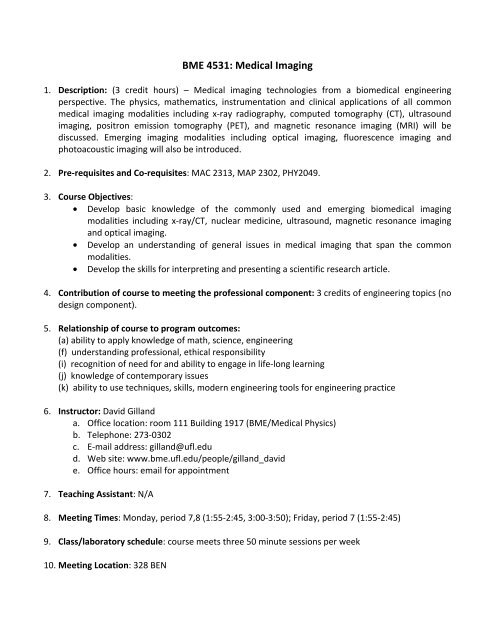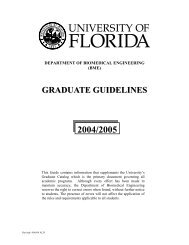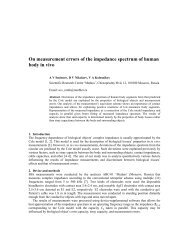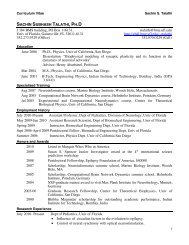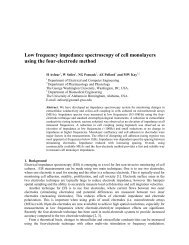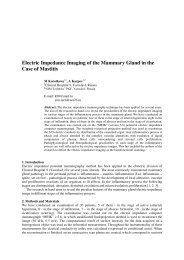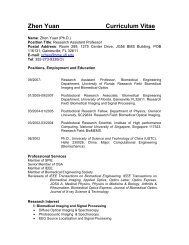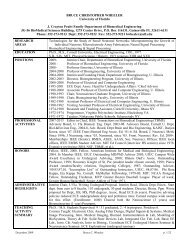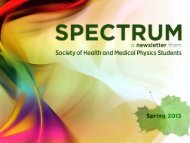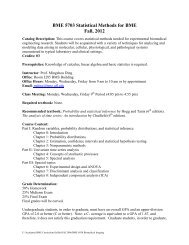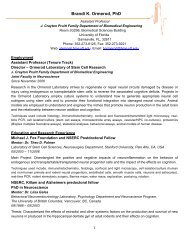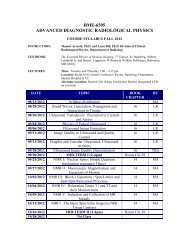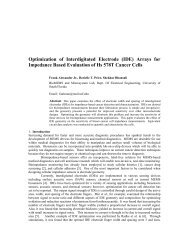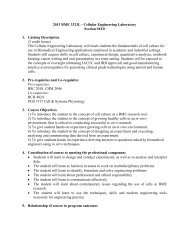BME 4531: Medical Imaging - Biomedical Engineering - University of ...
BME 4531: Medical Imaging - Biomedical Engineering - University of ...
BME 4531: Medical Imaging - Biomedical Engineering - University of ...
Create successful ePaper yourself
Turn your PDF publications into a flip-book with our unique Google optimized e-Paper software.
<strong>BME</strong> <strong>4531</strong>: <strong>Medical</strong> <strong>Imaging</strong> <br />
1. Description: (3 credit hours) – <strong>Medical</strong> imaging technologies from a biomedical engineering <br />
perspective. The physics, mathematics, instrumentation and clinical applications <strong>of</strong> all common <br />
medical imaging modalities including x-‐ray radiography, computed tomography (CT), ultrasound <br />
imaging, positron emission tomography (PET), and magnetic resonance imaging (MRI) will be <br />
discussed. Emerging imaging modalities including optical imaging, fluorescence imaging and <br />
photoacoustic imaging will also be introduced. <br />
2. Pre-‐requisites and Co-‐requisites: MAC 2313, MAP 2302, PHY2049. <br />
3. Course Objectives: <br />
• Develop basic knowledge <strong>of</strong> the commonly used and emerging biomedical imaging <br />
modalities including x-‐ray/CT, nuclear medicine, ultrasound, magnetic resonance imaging <br />
and optical imaging. <br />
• Develop an understanding <strong>of</strong> general issues in medical imaging that span the common <br />
modalities. <br />
• Develop the skills for interpreting and presenting a scientific research article. <br />
4. Contribution <strong>of</strong> course to meeting the pr<strong>of</strong>essional component: 3 credits <strong>of</strong> engineering topics (no <br />
design component). <br />
5. Relationship <strong>of</strong> course to program outcomes: <br />
(a) ability to apply knowledge <strong>of</strong> math, science, engineering <br />
(f) understanding pr<strong>of</strong>essional, ethical responsibility <br />
(i) recognition <strong>of</strong> need for and ability to engage in life-‐long learning <br />
(j) knowledge <strong>of</strong> contemporary issues <br />
(k) ability to use techniques, skills, modern engineering tools for engineering practice <br />
6. Instructor: David Gilland <br />
a. Office location: room 111 Building 1917 (<strong>BME</strong>/<strong>Medical</strong> Physics) <br />
b. Telephone: 273-‐0302 <br />
c. E-‐mail address: gilland@ufl.edu <br />
d. Web site: www.bme.ufl.edu/people/gilland_david <br />
e. Office hours: email for appointment <br />
7. Teaching Assistant: N/A <br />
8. Meeting Times: Monday, period 7,8 (1:55-‐2:45, 3:00-‐3:50); Friday, period 7 (1:55-‐2:45) <br />
9. Class/laboratory schedule: course meets three 50 minute sessions per week <br />
10. Meeting Location: 328 BEN
11. Material and Supply Fees: None <br />
12. Textbooks and S<strong>of</strong>tware Required <br />
a. Title: Introduction to <strong>Biomedical</strong> <strong>Imaging</strong> <br />
b. Author: Andrew Webb <br />
c. Publication date and edition: 2003, 1 st edition; John Wiley & Sons, Inc. <br />
d. ISBN number: 0-‐471-‐23766-‐3 <br />
13. Recommended Reading: additional reading assignments wll be distributed in class. <br />
14. Course Outline <br />
Week Topic <br />
1 Introduction to biomedical imaging <br />
2 General image characteristics <br />
3 General image characteristics <br />
4 x-‐ray/CT <br />
5 x-‐ray/CT <br />
6 X-‐ray/CT – student presentations <br />
7 Nuclear medicine <br />
8 Nuclear medicine-‐ student presentations <br />
9 Midterm; Ultrasound <br />
10 Ultrasound <br />
11 Ultrasound –student presentations <br />
12 MRI <br />
13 MRI <br />
14 MRI –student presentations <br />
15 Emerging modalities, Exam 2 <br />
15. Attendance and Expectations: On time class attendance is required. Chronic tardiness or absence <br />
will negatively impact the final grade. <br />
Expectations: <br />
• Be to class on time. <br />
• no cell phone disruptions or e-‐device distractions. <br />
• turn in homework on time and make legible <br />
• better late than never <br />
• ask for help if you need it <br />
16. Grading: <br />
40% Homework <br />
15% Presentation
20% Exam 1 <br />
25% Exam 2 <br />
17. Grading Scale: <br />
A = 93 – 100, A- = 90 – 92<br />
B+ = 87 – 89, B = 83 – 86, B- = 80 – 82<br />
C+ = 77 – 79, C = 73 – 76, C- = 70 – 72<br />
D = 61 – 70 <br />
A C-‐ will not be a qualifying grade for critical tracking courses. In order to graduate, students must <br />
have an overall GPA and an upper-‐division GPA <strong>of</strong> 2.0 or better (C or better). Note: a C-‐ average is <br />
equivalent to a GPA <strong>of</strong> 1.67, and therefore, it does not satisfy this graduation requirement. For <br />
more information on grades and grading policies, please visit: <br />
https://catalog.ufl.edu/ugrad/current/regulations/info/grades.aspx <br />
18. Make-‐up Exam Policy – Exams can be rescheduled for an individual due to sickness or religious <br />
holidays. The instructor must be notified in advance. <br />
19. Honesty Policy – All students admitted to the <strong>University</strong> <strong>of</strong> Florida have signed a statement <strong>of</strong> <br />
academic honesty committing themselves to be honest in all academic work and understanding <br />
that failure to comply with this commitment will result in disciplinary action. This statement is a <br />
reminder to uphold your obligation as a UF student and to be honest in all work submitted and <br />
exams taken in this course and all others. <br />
Unless otherwise stated, all homework for this class must be done individually. In this class it is a<br />
violation <strong>of</strong> the Academic Honesty code to obtain assistance on homework assignments<br />
from other individuals without acknowledging such.<br />
20. Accommodation for Students with Disabilities – Students Requesting classroom accommodation <br />
must first register with the Dean <strong>of</strong> Students Office. That <strong>of</strong>fice will provide the student with <br />
documentation that he/she must provide to the course instructor when requesting <br />
accommodation. <br />
21. UF Counseling Services – Resources are available on-‐campus for students having personal <br />
problems or lacking clear career and academic goals. The resources include: <br />
• UF Counseling & Wellness Center, 3190 Radio Rd, 392-‐1575, psychological and psychiatric <br />
services. <br />
• Career Resource Center, Reitz Union, 392-‐1601, career and job search services. <br />
• SHCC mental Health, Student Health Care Center, 392-‐1171, Personal and Counseling <br />
• Center for Sexual Assault/Abuse Recovery and Education (CARE), Student Health Care <br />
Center, 392-‐1161, sexual assault counseling <br />
• Career Resource Center, Reitz Union, 392-‐1601, career development assistance and <br />
counseling <br />
22. S<strong>of</strong>tware Use – All faculty, staff and student <strong>of</strong> the <strong>University</strong> are required and expected to obey <br />
the laws and legal agreements governing s<strong>of</strong>tware use. Failure to do so can lead to monetary <br />
damages and/or criminal penalties for the individual violator. Because such violations are also
against <strong>University</strong> policies and rules, disciplinary action will be taken as appropriate. We, the <br />
members <strong>of</strong> the <strong>University</strong> <strong>of</strong> Florida community, pledge to uphold ourselves and our peers to the <br />
highest standards <strong>of</strong> honesty and integrity.


